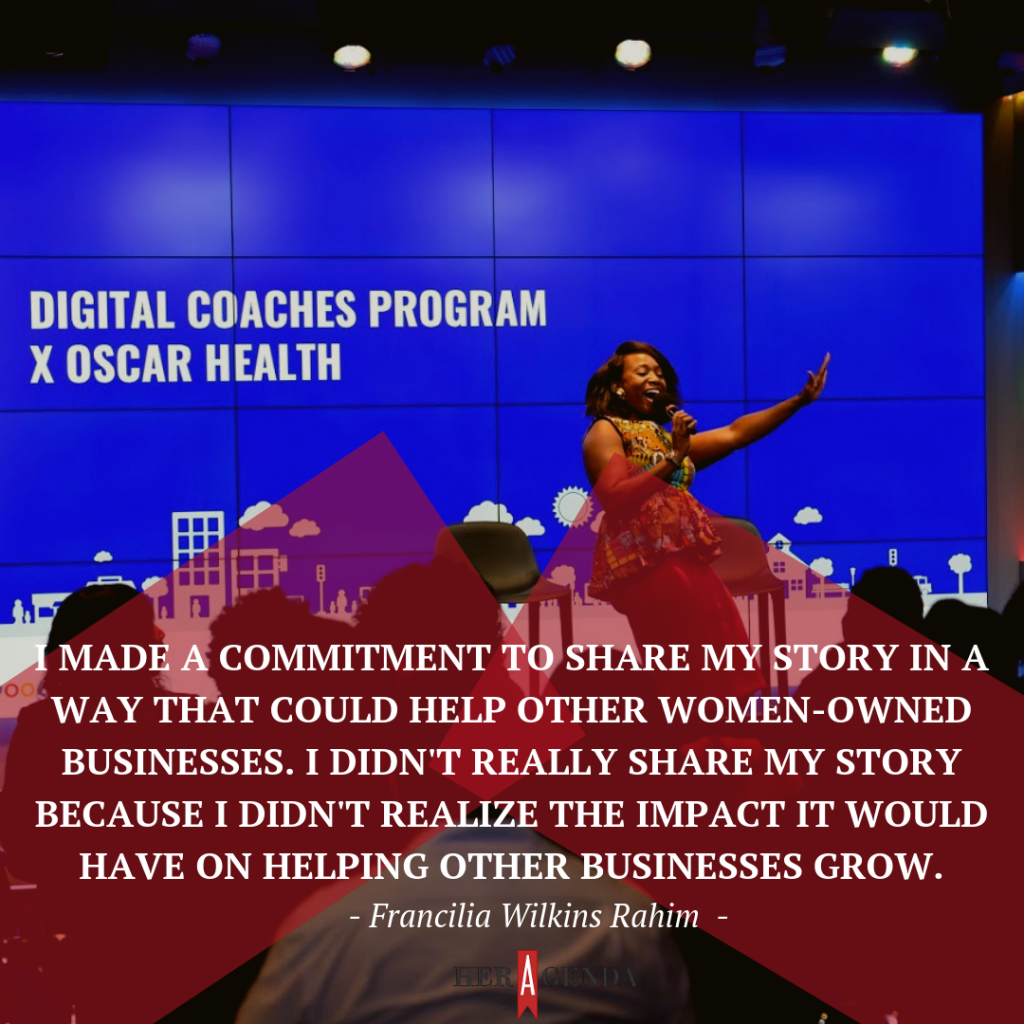Francilia Wilkins Rahim is the founder and CEO of R.F. Wilkins Consulting, a business development and management consulting firm based in New York City. The daughter of Liberian parents who fled the country for safety during Liberia’s civil war, she understood from a young age what her parents had to sacrifice to give her the opportunity to thrive.
After graduating with her MBA and not getting a call back on over 200 job applications in the height of the United State’s last recession, Rahim decided to create her own path, starting her company at the age of 23. Today, Rahim employs 5 full-time staff, as well as a number of project-based staff and her company has raised nearly $900 million dollars in capital for her clients. Eight years in, her goal is clear: to be one of the largest minority-owned consulting firms in the United States, and as a leader, she’s very intentional about sharing this vision with her team.
For so long, Rahim has been quiet when it comes to sharing her story and all that she’s accomplished. However, she’s realized that if her story can help other women or minority business owners, everybody wins. In this interview, Rahim reminds us all that we are enough, and that we can leverage what we have to create the path we want.

Her Agenda: What’s your background, where are you from?
Francilia Wilkins Rahim: I am of Liberian descent and was actually born in Liberia. Interesting story — and I think my story kind of leads to where I am today — my mother was the Assistant Minister of Agriculture for Liberia and my father was a petroleum geologist. Liberia was an American colony, and there was a 15-year war that went on in the country. My parents told stories of running us through carnage and dead bodies to get us out of the war zone. Growing up I had no idea that my mom was this huge government official until I was in college. I was at St. John’s University in my junior year, and I had to do a report in my African American studies class about the diaspora. I chose to do my report on Liberia, and while doing research I found an article online. It was the minutes from a meeting of all the presidents of the countries of the world, and who was representing Liberia, my mom.
I had no idea about her background; we didn’t talk about it until I was 21. She told me [that] during the war, she worked with the government. She was a young professional woman, one of very few women in her department helping to represent the country of Liberia. She said that no one ever believed it (war) would happen. She was away at a conference in Europe when the war broke out. She told me that she had to struggle to get our family out of the country, she thought we all died. She said because of that, she vowed that she would never put work before her kids again, and she kept her word.

Her Agenda: Tell us about your business.
Francilia Wilkins Rahim: I own and operate F. R. Wilkins Consultants. We are a business development and management consultant firm and help with two arms of business. The first is fundraising; to date we have raised close to $900, million dollars for projects all throughout the state. The second is project management; we bring projects to fruition.
Projects could be anything from New York City government saying that they want to create a fund for emerging minority developers, a nonprofit wanting to expand their social service arm, to a company like Google — our newest client — who may want to engage small businesses.

Her Agenda: What was the spark at 23 years old to start a company?
Francilia Wilkins Rahim: It wasn’t part of my initial plans. People sometimes think when we start a business, you have your business plan laid out and everything is so amazing and then, boom, you’ve done it and it’s successful. That’s not really the story for many people. I finished my MBA at St. John’s University in 2011. I had all this experience behind me and all I knew was that I would work with a large consulting firm and from there, start a company. The recession was like, no girl, it’s going to be a different story, you have a different path. I applied for like 200 different jobs – probably more than that – and I didn’t hear back from one. Why? Because we were in the middle of a recession in this country and you could not pay someone to hire you. I had all these private student loans and those things had to get paid. I lived in New York, so, rent had to get paid. It’s not like my family could cover those costs for me.
The only thing I knew was that I was really good at raising money and I was really good at making projects come alive. [One] client through word of mouth brought on my second client and that second client is still a client today. I tell people all the time that we did very, very, excellent work. Today we can say that we’ve raised almost $900 million for our clients. It took a lot of blood, sweat, and tears and it wasn’t easy, pretty, beautiful, or fabulous. And it’s still not.

Her Agenda: You work with the private sector, the public sector, and nonprofits. What informed the scope of your work when you started?
Francilia Wilkins Rahim: I didn’t start off with the utmost clarity on our sectors of business. I wasn’t even very clear on what we could provide to markets specifically as it pertains to what they wanted to buy. I was only clear on the things that I was good at — and even that I wasn’t so clear on. I realized quickly that I needed to speak the language of my potential customer for them to even want to engage me. I was 23 when I started the company with little experience and not so many relationships anywhere in New York, like real relationships with folks that could make a difference or change. I started on this trajectory of having to prove myself.
I knew that I could write really well. Anything that had to do with grant writing or an RFP, but I didn’t know what that would look like. So the first thing I can say is that I had to do a lot of research. Google is your best friend. I tell every business owner today, we are spoiled because we live in a space where you have access to online search that can teach us anything. So I led with a lot of searching just to understand the spaces that I was trying to do work in. That’s number one because I never wanted to walk into a meeting or sit down at a table with people who look like, ‘Who’s this kid who doesn’t know what the heck they’re saying’ and so on and so forth. I never wanted my age to be a thing.

I started with grant writing and started getting really good at it, and then because of that I got really connected in the government space and nonprofit space and began to realize what their needs were. I quickly realized that there was also a lot of money in the private sector and that everyone is looking for some type of development or expansion for their business. I don’t care if it’s government, I don’t care if it’s nonprofit. Every single company, I don’t care what type, needs some level of project management or fundraising and capital sourcing to bring them money.
By doing the work, I was able to define who my target market was. And then I was able to define what other needs this target market may have, and I began using and leveraging the skills that I had.

Her Agenda: What have you learned about yourself throughout 8 years of business, and how do you stay motivated?
Francilia Wilkins Rahim: I had this client before, who I won’t name, but they weren’t a minority. When we started working together they had no knowledge about the sector that they wanted to grow into, but they had a lot of money. After about six months of entry in the sector, they started saying that they were the best; they told everybody. They even put it up on their website, that they were the number one provider. After they said it enough, everybody started saying it also.

As women and minority-owned businesses, we shy away from showing all of the amazingness that we’re doing. We never think it’s enough. I only recently started speaking about the amount of money we raised. I never thought it was anything until I sat down with a gentleman who was shocked at our accomplishments. I was like, “Oh yeah, well it is what it is.” And he was like, “Do you know what you’re saying right now?” He had to tell me that I’m greater than how I was thinking about myself and positioning myself.
Don’t ever think that you’re not enough. Whatever you already have, even if it’s not perfectly packaged, it’s enough. Whatever you have right now, you’re enough. Start speaking into existence where you want to go and that whatever you have right now will be the tools that allow that conversation to be relevant in whatever market you’re in.

Her Agenda: How did you become a Google Digital Coach? And what is the program all about?
Francilia Wilkins Rahim: The Google Digital Coaching program is amazing. I had just gotten married and came back from my honeymoon when Google reached out. There was an event coming up and they wanted small business owners to speak on this panel; like a seven-minute Ted Talk style conversations to help small businesses. The next day after coming off of a 24-hour flight, I was at the event. Google came back a few days later and let me know that they were looking for a small business in New York to manage the NYC market.
The Google Digital Coach program is Google’s initiative to intentionally commit towards investing in a woman or minority-owned businesses. We believe that these businesses are the future, we see their buying power and we believe that because they are not as digitally engaged as their non-minority counterparts parts, they are not on the same playing field as it pertains to their business. Because of this, Google decided to start the Google Digital Coach program.

At the beginning of the year, I made a commitment to share my story in a way that could help other women-owned businesses. I didn’t really share my story because I didn’t realize the impact it would have on helping other businesses grow. Google was one of the things that happened to fall into my lap and from there I was able to get the NYC contract. When you do decide and make that intentional decision to give back and invest in small businesses, especially women and minority-owned businesses — because we need the support –that commitment always comes back to you.
Her Agenda: What do you think is the best piece of advice that you’ve ever received?
Francilia Wilkins Rahim: Some of the best advice that I have received professionally is, you are enough. It’s something that I have to tell myself over and over, that I am enough, that there’s a picture that’s way bigger than me. There’s a lot of money out there. There are resources out there that you can leverage. Stop being the thing that’s holding yourself back.

Her Agenda: What’s your goal with your business? And how is your work helping to create a path for Black and Brown people?
Francilia Wilkins Rahim: F.R. Wilkins Consults will be one of the largest minority-owned consulting firms in the United States first and then a Fortune 100 firm second. That is the goal and that is the track that all of my staff know that we are on. I’m very intentional about sharing that with the team.
This is important to me because I’ve realized that it will allow me to create jobs and opportunities for people who look like me. When I was growing up, we were the only Black family (in Rhode Island) until I hit middle school. In my early jobs, I can remember being one of very few African American women. I understand how it feels to not be necessarily comfortable; to change how you speak, change how you’re operating in this environment that you’re not 100 percent part of.
I have colleagues and friends who are at very high levels in their professional jobs and are still dealing with these kinds of microaggressions that are targeted towards them in their work environment and workplace, and feeling like they’re crazy because they can’t put language behind what’s happening.
Her Agenda: Any final words of wisdom for women looking to make big moves in their lives and careers?
Francilia Wilkins Rahim: Other than understanding that you’re good enough, create opportunities to partner and be open to talk about the things that you’re doing. I am committed to creating jobs and opportunities for those who look like me and to mentor as I walk along this path as much as I can. Mentor people so that they feel like they can create these structures too. If there are enough structures or businesses owned by minorities and women that create jobs, we can literally change the economics of the world.
Also, learn to say “no.” Learn how to take care of yourself and and not feel like you are obliged to say yes to everything.
Lastly, don’t be afraid to talk about what your needs are and help people while you’re on the way towards success.

[Editor’s note: This interview has been edited for length and clarity.]








